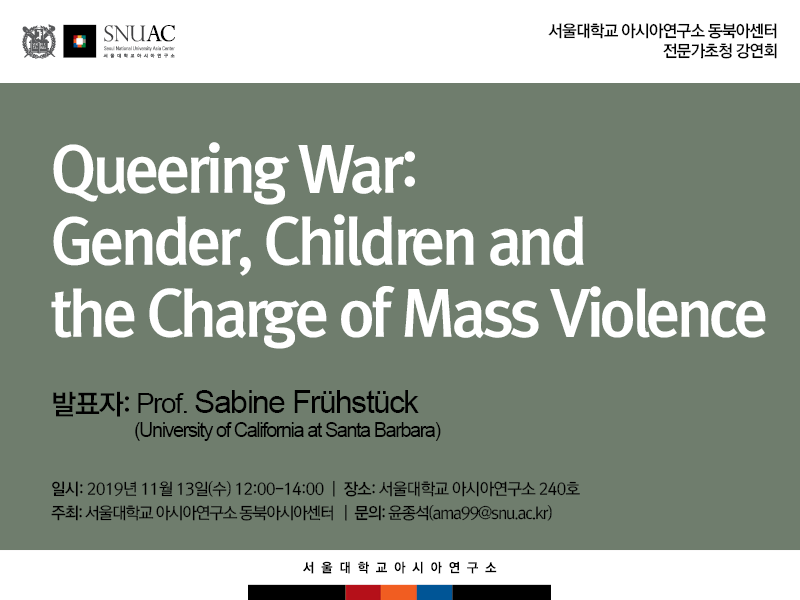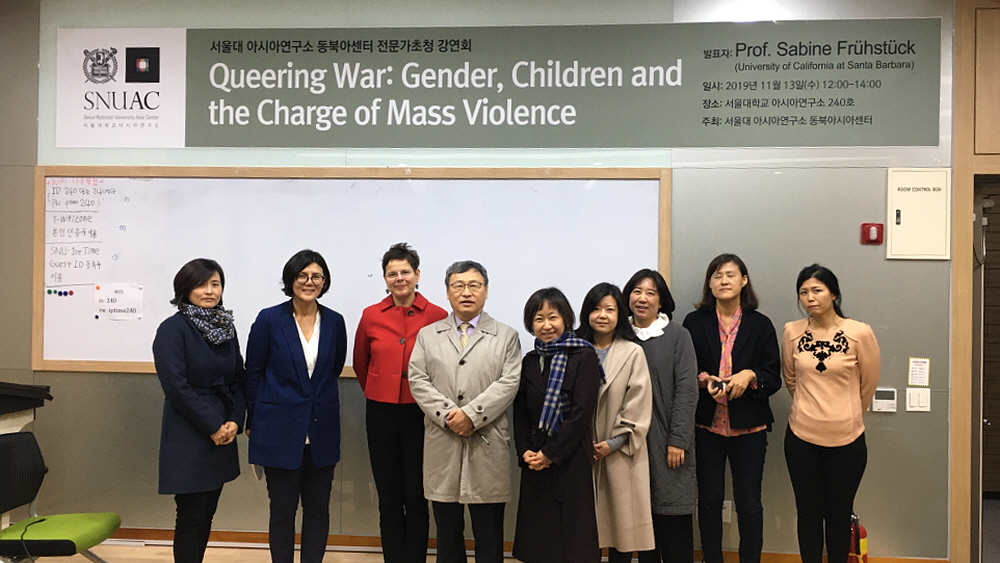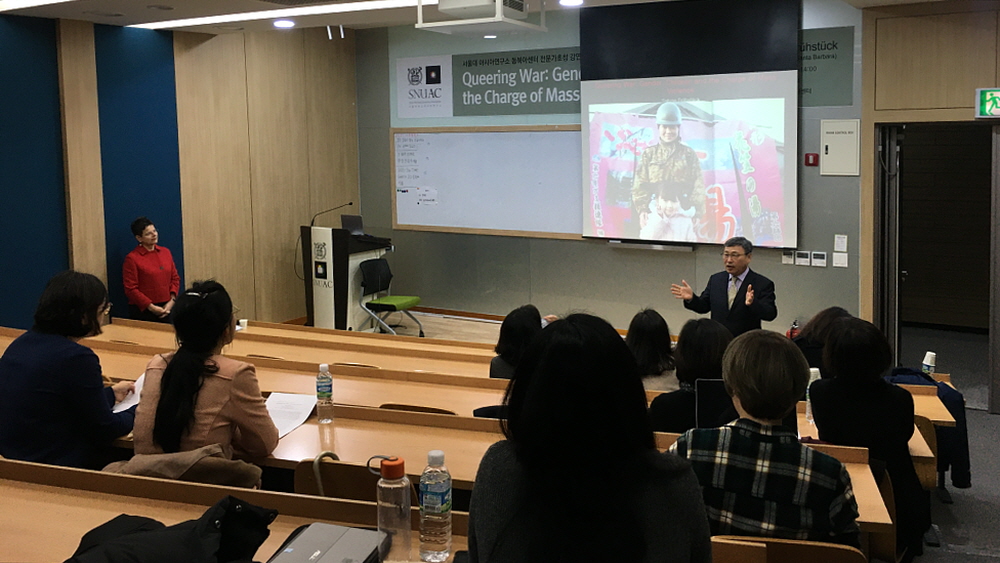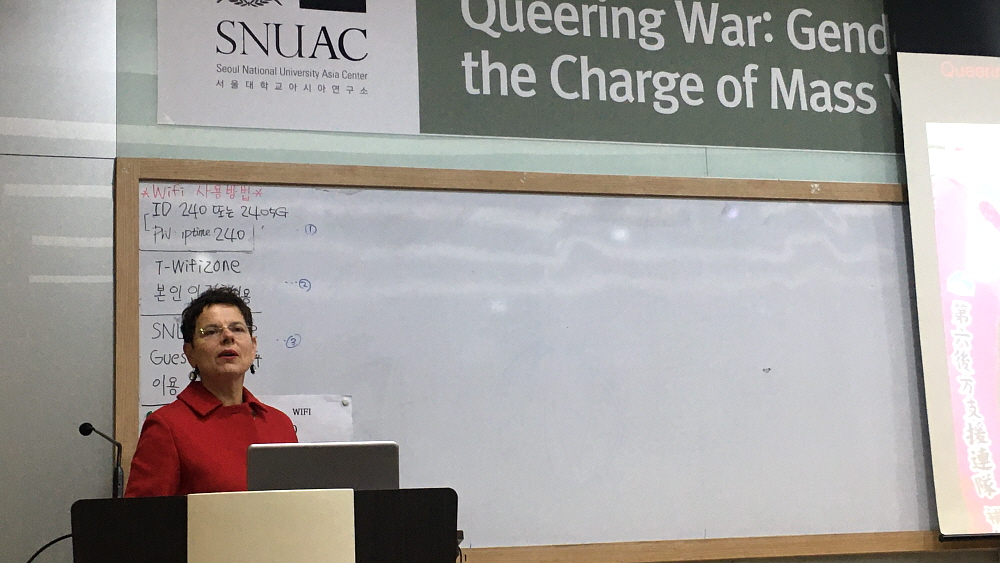
Sabine Frühstück
Koichi Takashima Chair in Japanese Cultural Studies
Professor, Department of East Asian Languages & Cultural Studies
University of California at Santa Barbara
fruhstuck@eastasian.ucsb.edu
http://www.eastasian.ucsb.edu/people/faculty/sabine-fruhstuck/
Sabine Frühstück is the Koichi Takashima Chair in Japanese Cultural Studies at the University of California at Santa Barbara. She is mostly interested in the study of modern and contemporary Japanese culture and its relationships to the rest of the world. Frühstück has published widely on the ageing of society, gender and sexuality, the military, war and violence, and childhood and play in modern and contemporary Japan. Her recent publications include Playing War: Children and the Paradoxes of Modern Militarism in Japan (University of California Press, 2017) and Child’s Play: Multi-sensory Histories of Children and Childhood in Japan (co-edited with Anne Walthall, University of California Press, 2017). She is currently completing a monograph on Gender and Sexuality in Modern Japan that is contracted with Cambridge University Press.
Queering War: Gender, Children and the Charge of Mass Violence
Not since the beginning of the twentieth century has a newly fervent rhetoric about the condition and future of Japan’s children and childhood so closely coincided with an equally heated debate about (the specter of) Japan’s rise as a military and war-making power. In debates regarding both issues, the figure of the child has been rhetorically mobilized to represent both national decline and a weakening of the late capitalist belief in a yet brighter, richer, and happier future. At the same time, children and their emotional value—replete with their presumed vulnerability, innocence, and sweetness, which has been so regularly utilized over the decades—appear to today hold more use value with the military than at any other moment since the end of the Asia-Pacific War. Yet, the terrain has shifted: the militarization of childhood of the modern era has lost ground to and is closely intertwined with the ever-multiplying mechanisms that further the infantilization of militarism.
In this talk, Frühstück analyzes various modes of “Queering War”—the ways the Self-Defense Forces and the U.S. Forces Japan have manipulated the categories of childhood and war in order to appeal to (eventually recruitable) children. While military recruitment materials around the world have claimed the capacity to turn formerly unformed and directionless children into adults and, particularly, boys into men, the Self-Defense Forces, more than any military establishment elsewhere, has taken a different route, instead variously infantilizing, feminizing, and sexualizing service members, potential recruits, and sympathizers. Such efforts are the means by which the Self-Defense Forces’ public relations apparatus attempts to ensure its viability in an environment marked by the contentious legacy of Japan’s imperialist war in Asia—as well as by an ever-shrinking population, whose young generation shows next to no signs of a will to war, thus potentially hampering the current administration’s aspirations.
Photo

Review
아시아연구소 동북아시아센터는 지난 11월 13일(수) 점심에 아시아연구소 240호에서 Sabine Frühstück 교수(University of California at Santa Barbara)를 모셔서 “Queering War: Gender, Children and the Charge of Mass Violence”을 주제로 현대 일본 사회의 변화에 대한 전문가 초청 강연회를 개최했다.
Frühstück 교수는 자위대와 주일미군이 어린이들에게 호소하기 위해 아동기(childhood)와 전쟁의 범주를 조작해왔음을 밝히면서, 젠더 시각에서 집단폭력(mass violence)이 아동에 대한 교묘한 선전과 조작을 통해 정당화되고 있음을 비판적으로 분석하였다. 일반적으로 군인 모집이나 선전들이 남성성을 주된 수단으로 활용하는 데 반해, 일본의 경우 군인과 잠재적 신병 및 동조자에 대한 유아화, 여성화, 성적 대상화(sexualize)한다는 점이 사진, 애니메이션, 동영상 자료를 통해 보다 생생하게 제시되었다. 강연자는 이러한 자위대의 홍보 전략이 과거 일본의 제국주의 전쟁의 논쟁적 유산에서 생존을 보장하려는 시도인 동시에, 현 정부의 기대와 달리 인구감소와 전쟁 의지를 크게 나타내지는 않는 청년 인구에 대한 대응방식임을 제시했다. 강연 후 참석자들과 진지한 논의가 이어지면서, 현대 일본 사회의 변화를 읽어내는 주요한 접근으로서 젠더에 대해서도 함께 공유하였다.







